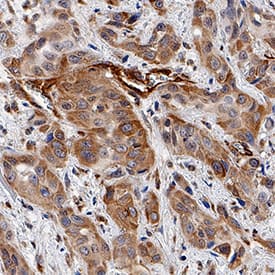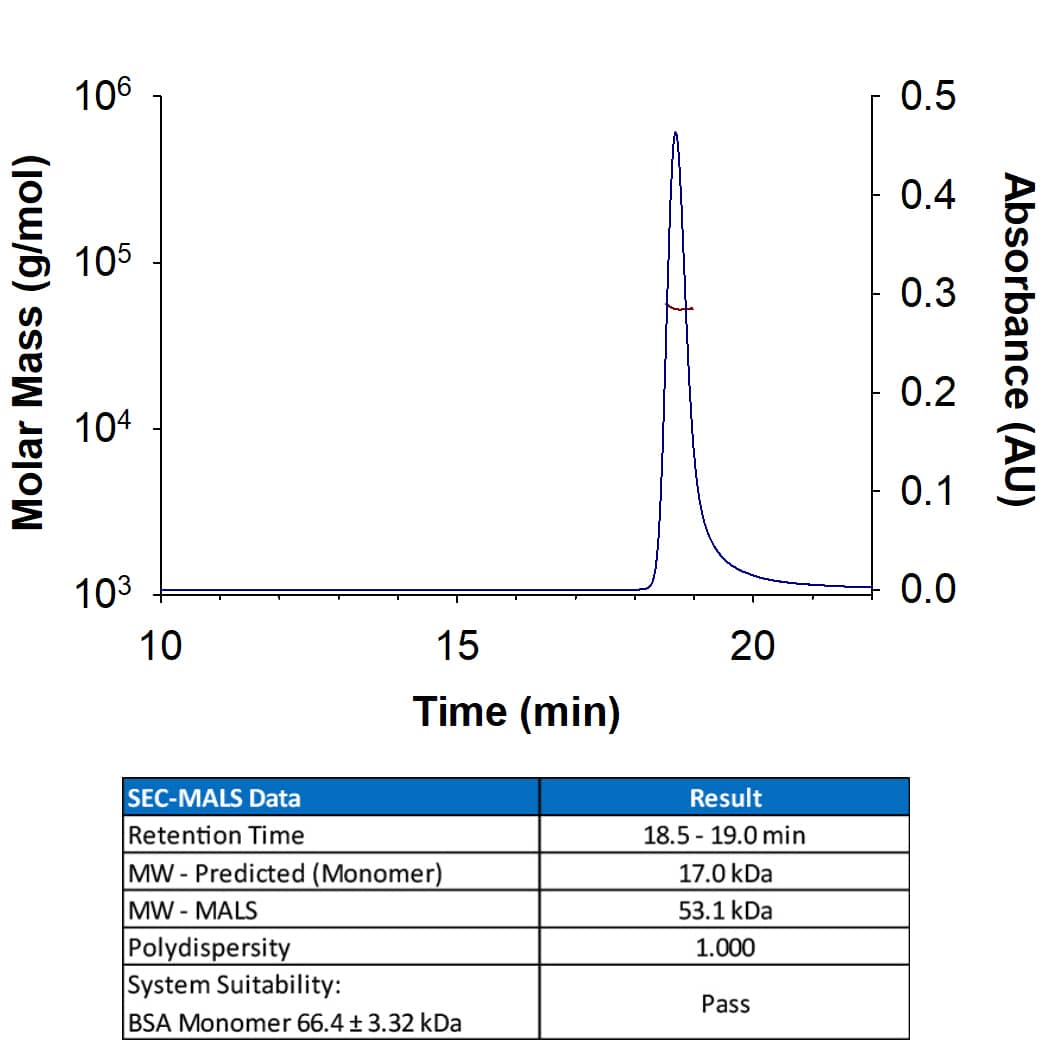Human Phospho-MLKL (T357) Antibody Summary
Accession # Q8NB16
Customers also Viewed
Applications
Please Note: Optimal dilutions should be determined by each laboratory for each application. General Protocols are available in the Technical Information section on our website.
Scientific Data
 View Larger
View Larger
Phospho-MLKL (T357) in Human Squamous Cell Carcinoma. MLKL phosphorylated at T357 was detected in immersion fixed paraffin-embedded sections of human squamous cell carcinoma using Mouse Anti-Human Phospho-MLKL (T357) Monoclonal Antibody (Catalog # MAB9187) at 5 µg/mL for 1 hour at room temperature followed by incubation with the Anti-Mouse IgG VisUCyte™ HRP Polymer Antibody (Catalog # VC001). Tissue was stained using DAB (brown) and counterstained with hematoxylin (blue). Specific staining was localized to cytoplasm in cancer cells. View our protocol for IHC Staining with VisUCyte HRP Polymer Detection Reagents.
Preparation and Storage
- 12 months from date of receipt, -20 to -70 °C as supplied.
- 1 month, 2 to 8 °C under sterile conditions after reconstitution.
- 6 months, -20 to -70 °C under sterile conditions after reconstitution.
Background: MLKL
Mixed Lineage Kinase Domain-Like (MLKL) is a 471 amino acid member of the protein kinase superfamily, but lacks several amino acid residues necessary for kinase activity. Phosphorylation of MLKL at T357 and S358 by receptor-interacting protein 3 (RIP3) causes trimerization and translocation of MLKL from the cytosol to the plasma membrane, where it mediates TNF-alpha induced necroptosis through membrane degradation and calcium influx. Low expression of MLKL has been found to be correlated with poor prognosis in cervical squamous cell carcinoma, pancreatic cancer, and ovarian cancer. Conversely, high expression of RIPK3 and MLKL in esophageal and colon cancer is associated with poor overall survival, possibly by promoting inflammatory cytokine production, sustaining tumor growth.
Product Datasheets
Citations for Human Phospho-MLKL (T357) Antibody
R&D Systems personnel manually curate a database that contains references using R&D Systems products. The data collected includes not only links to publications in PubMed, but also provides information about sample types, species, and experimental conditions.
2
Citations: Showing 1 - 2
Filter your results:
Filter by:
-
Excess fructose enhances oleatic cytotoxicity via reactive oxygen species production and causes necroptosis in hepatocytes
Authors: J Kanazawa, K Kakisaka, Y Suzuki, T Yonezawa, H Abe, T Wang, Y Takikawa
The Journal of nutritional biochemistry, 2022-05-21;0(0):109052.
Species: Human
Sample Types: Whole Tissue
Applications: IHC -
ABT?737, a Bcl?2 family inhibitor, has a synergistic effect with apoptosis by inducing urothelial carcinoma cell necroptosis
Authors: R Cheng, X Liu, Z Wang, K Tang
Molecular Medicine Reports, 2021-03-31;23(6):.
Species: Human
Sample Types: Cell Lysates
Applications: Western Blot
FAQs
No product specific FAQs exist for this product, however you may
View all Antibody FAQsIsotype Controls
Reconstitution Buffers
Secondary Antibodies
Reviews for Human Phospho-MLKL (T357) Antibody
There are currently no reviews for this product. Be the first to review Human Phospho-MLKL (T357) Antibody and earn rewards!
Have you used Human Phospho-MLKL (T357) Antibody?
Submit a review and receive an Amazon gift card.
$25/€18/£15/$25CAN/¥75 Yuan/¥2500 Yen for a review with an image
$10/€7/£6/$10 CAD/¥70 Yuan/¥1110 Yen for a review without an image















